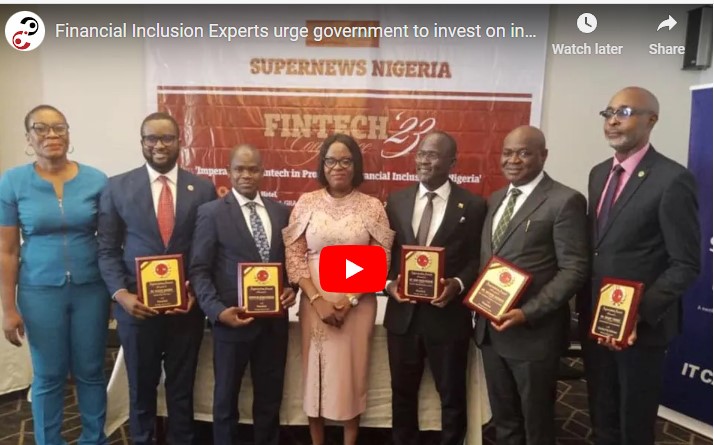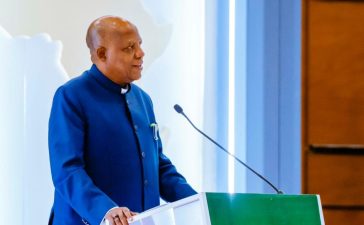The need to scale up development in technology as well as collaborate while creating innovative products in financial services formed the core of conversations at the just concluded FINTECH Conference organized by publishers of Super News Nigeria which came up last week in Lagos.
AV1 News reports that Participants at the event were drawn from various aspects of the nation’s financial sector and discussions focused on opportunities that come with financial inclusion and the need to enhance security and infrastructure in the delivery of financial services.
Publisher and CEO Super News Nigeria, Ngozi Onyeakusi described the theme of the conference as one that comes with a sense of urgency on the role of technology in Financial Inclusion as it holds great potentials for the Nigerian economy and for the financial stability of the country.
Referring to the emergence of Covid-19 in 2020, she emphasized the role of financial technology in the daily lives of Nigerians, accessing financial services, and the challenges many have experienced in recent times.
“This conference is a learning opportunity designed to enhance awareness, deepen understanding of participants in the role of fintech in rendering banking, capital market, insurance and pension services cheaper, faster and conveniently, ”
Speaking on behalf of the Chairman of the occasion Mr. Sunday Thomas, CEO National Insurance Commission, Mr. Ajibola Bankole disclosed that much is yet to be done in reaching financial inclusion goals as set by the National Financial Inclusion Strategies (NFIS).
Financial inclusion according to Global Partnership for Inclusion (2011) is a state in which all working adults have effective access to credit, savings, payment and insurance from formal providers. Effective access will involve convenient and responsible service delivery at a cost affordable to the consumer and sustainable to the provider with the result that the financially excluded becomes included.
” It is worthy to note that financial inclusion has assumed a critical development policy priority in Nigeria with the National Financial Inclusion Strategy (NFIS) which was aimed at reducing the exclusion gap to 20% at the end of 2020. But the reality of time shows that data produced by EFina revealed that although some progresses have been made, as those that are financially excluded have reduced from 52% that’s about 45,520 million in 2008 to about 36% (about 28 million in 2020). It appears the financial technology and current services have not been able to get to these group of people that we are talking about. Therefore there is need for the goals of the NFIS to be revamped to capture this reality. ”
Government’s role in providing an enabling environment and infrastructure for technology over the years was also highlighted by some of the speakers. Mr. Abdulkadir Abbas, Director Registration, Exchange, Market Infrastructure & Innovation who represented the Director General of the Commission Mr. Lamido Yuguda described the theme of the event ‘ Imperative of Fintech in promoting financial inclusion in Nigeria’ as appropriate. According to him, transformation in the Nigerian Capital Market is incomplete without the role of financial technology.
“We can see a kind of game changer and rapid transformation in the financial sector due to fintech. It is a building block for enhancing financial inclusion. Traditional means can no longer work, the average age of investors in the capital market is 45-50 years and we are currently trying to attract the millennials to the market and this can be achieved with the aid of fintech.
“We are exploring ways to leverage on fintech to bring on the young people to the market. The capital market sees fintech as an opportunity, and that is one of the ways we intend to change the dynamics of the capital market.”
He also stated that it was in view of the importance of fintech that the capital market initiated the fintech roadmap, which enabled the Securities and Exchange Commission (SEC) to come up with innovations and rules to support the initiative.
“We had to come up with rules to support it like the rules on crowdfunding, among others. We all saw the success achieved with the electronic offering by MTN. A lot of Nigerians were able to subscribe with their phones and other gadgets conveniently. We realized that one of the ways to unlock investment opportunities is through fintech, and we are stepping up such strategies to deepen the market. ”
However, he expressed the need to strike a balance between investor protection and innovation, adding that financial inclusion can not be achieved without a good strategy for financial literacy. He expressed the readiness of the Commission to collaborate with other regulators and stakeholders in the quest to attract more investors to the capital market and grow the economy.
Managing director Tangerine General Insurance Mr. Mayowa Adeduro spoke on the relativity between poverty and financial inclusion stating that over 133 million Nigerians are at the risk of dying in poverty.
‘Just about 50% of adults are captured in the banking sector. The penetration level in the insurance sector is even worse. It is below 1% for the population. The poverty level in sub-Saharan African is 88%, in Europe its just 22%. And the difference here is Financial inclusion. If there is no fundamental investment in infrastructure we won’t get there. We are recall what happened when the issue of cashless policy came up. It was as if the entire system almost collapsed. So there is need to invest in infrastructure. And there is need for education. The literacy rate that we have today, cannot sustain the type of financial inclusion that wee are all clamouring for. ”
At the end of the conference, it was agreed by all stakeholders that innovative collaboration and advocacy and is the way forward with emphasis on financial literacy especially in view of the rapid development witnessed in the world today.







